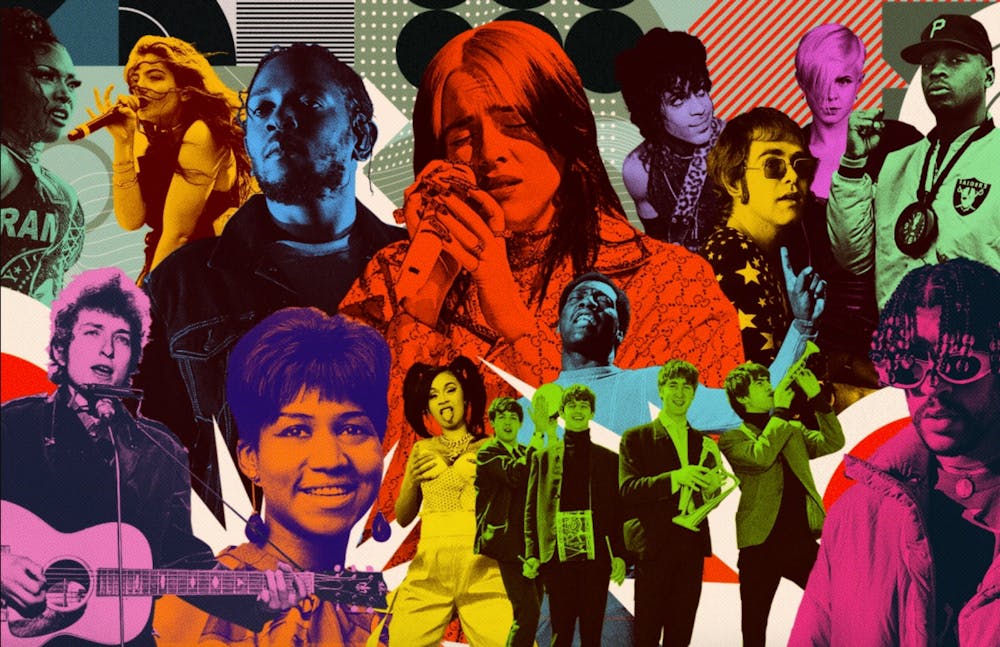Attempting the impossible yet again, Rolling Stone has compiled almost one hundred years’ worth of sound into one large, neat (and browser-crashing) list dedicated to the greats.
Aretha Franklin’s “Respect” was crowned best song of all time, followed by “Fight the Power” (Public Enemy), “A Change is Gonna Come” (Sam Cooke), “Like a Rolling Stone” (Bob Dylan) and “Smells Like Teen Spirit” (Nirvana) filling out the rest of the top five. Other top ten positions were given to The Beatles, Fleetwood Mac, Marvin Gaye, Missy Elliot and OutKast.
Perhaps the only list where Robyn’s “Dancing on my Own” and John Lennon’s “Imagine” will ever be ranked side by side, specifically at number 20 and number 19, it includes a variety of genres and representation from every decade since the 1930s. While many of the songs are instantly recognizable, whether they be pop favorites or timeless ballads, it wouldn’t be the “500 Greatest Songs of All Time” without controversy and the plague of rockism.
While everyone has their own opinions about music, and is entitled to their favorites, the belief that rock music is elevated over other genres has held much of the mainstream conversation surrounding music back for far too long. From social media to music journalism, rockism has added layers of pretentiousness, hostility, and close-mindedness, harming not only the analysis and criticism of music, but the support for diversity in the industry. This was even present in the earliest version of “500 Greatest Songs of All Time.”
Rolling Stone published their first iteration of the list in 2004. It instantly became one of their most-read articles. A revision was issued in 2011 for a special edition of the publication that included twenty-five new titles predominantly from the 2000s. The top twenty-five remained unchanged, with Bob Dylan’s “Like a Rolling Stone” keeping its spot at number one. A majority of the artists were white, male, English-speaking classic rock musicians. This is the first time the magazine has remade the list, and its reflection of a new era has angered many music fans.
Over 250 figures in the music recording and journalism industries were contacted and told to submit their 50 favorite songs, which Rolling Stone then organized into one comprehensive list. With over 4,000 songs received, the publication noted that this survey included a more diverse set of genres than its heavily American and British classic rock-focused 2004 edition.
While this new update better reflects the wide variety in genres and is a welcome change from the old and limiting definition of truly “great music,” some readers still expressed distaste over the new direction.
The Rolling Stone comment section was filled with opinions, some more strongly worded than others:
“This list is like a dad and his teenage daughter taking turns picking a song to listen to on a long… awkward drive to the grave. To pay their final respect to music?”
“Alternative title, ‘What Some Random Selection of a Couple Dozen People’s Lowest Common Denominator Think Are the 500 Greatest Songs Ever.’”
“This entire list is a crime against humanity.”
It should also be noted that these commenters were advocating for more classic rock and attacking the modern pop music selections.
Beyond the knee-jerk reactions, this outrage is reflective of the grossly misinformed opinion that modern and progressive is inferior to the classics. In fact, Rolling Stone has previously generated controversy over its lack of diverse artists in its “greatest of all time” compilations. With the release of this article, which features a relatively more diverse selection of modern artists, some media outlets accused Rolling Stone of “going woke,” prioritizing certain artists for their demographics rather than their artistry. However, over two-thirds of the 2021 selection are from the classic rock golden years of the 60s, 70s and 80s. Over 80% of all additions were released before 2004. These decades correlate to a predominantly white, male-dominated music scene. Despite the majority of the list still being dedicated to such artists, the slight increase in modern music has left some readers disappointed, claiming the supposed superiority Pink Floyd holds over Lorde.
Regardless of the wave of rockism that accompanied the article, there were some notable surprises. “Dreams” by Fleetwood Mac was an entirely new addition, landing in the top 10 at number 9. Thirty songs from the 2010s were included, and one from 2020. Over half of the songs included didn’t even appear on the original 2004 list. This is reflective of the new direction of music appreciation, and the artists that make it.
For example, Lizzo’s “Truth Hurts” (number 497), Carly Rae Jepsen’s “Call Me Maybe” (436), TLC’s “No Scrubs” (303), Beyoncé’s “Single Ladies” (228) and Lorde’s “Royals” (30) were among the new pop songs added. “In Da Club” by 50 Cent, “Juicy” by Notorious B.I.G. and “Runaway” by Kanye feat. Pusha T served as a few of the representations for the rap genre. From the Latin music scene, “Gasolina” by Daddy Yankee and “Amor Prohibido” by Selena were included, being some of the few non-English songs featured in the article.
With this greater variety in what is considered society’s top hits, as well as the inclusion of other groundbreaking artists such as Lil Nas X, Taylor Swift, Kendrick Lamar and others, we can all hope to one day see an edition of “500 Greatest Songs” that truly reflects the diversity of great music. Until then, these little changes serve as a step in the right direction.
Get The Chronicle straight to your inbox
Signup for our weekly newsletter. Cancel at any time.

